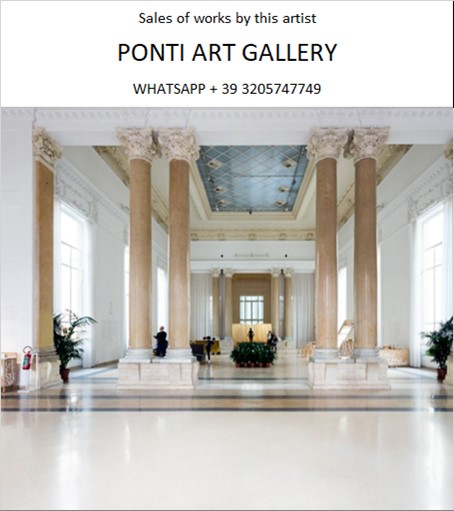Ponti Art Gallery is interested in buying and selling works
of art by this artist.

Sayed Haider-Raza Biography
Sayed Haider Raza, commonly known as S.H. Raza, was an eminent Indian artist whose career spanned more than seven decades and whose work played a pivotal role in modern Indian art. Born on February 22, 1922, in the village of Babaria, Mandla district, in the central Indian state of Madhya Pradesh, Raza was the son of Sayed Mohammed Razi, a forest ranger, and Tahira Begum. His early years were spent in close proximity to nature, which would later become a significant influence on his artistic work.
Raza's interest in art began at an early age, and by the time he was 12, he had already started drawing. After completing his high school education in Damoh, he pursued further studies at the Nagpur School of Art from 1939 to 1943. His artistic journey continued at the Sir J.J. School of Art in Mumbai, where he studied from 1943 to 1947. It was during this period that Raza's work evolved from expressionistic landscapes to abstract ones, and he began to establish himself as a significant figure in the Indian art scene.
In 1947, a pivotal year for both India and Raza, he co-founded the Progressive Artists' Group (PAG) in Mumbai along with K.H. Ara and F.N. Souza. The group aimed to break free from the influences of European realism and incorporate Indian inner vision into their art. The PAG was instrumental in introducing new ways of seeing and depicting Indian subject matter, combining avant-garde Western styles with Indian themes.
Raza's early paintings included watercolors of landscapes and townscapes, capturing the essence of Mumbai's streets at different times of day and in varying weather conditions. His work from this period was characterized by a vibrant use of color and an expressive language that was beginning to hint at the abstraction that would later define his oeuvre.
In 1950, Raza's artistic trajectory took a significant turn when he moved to Paris on a French government scholarship to study at the École Nationale Supérieure des Beaux-Arts. This move marked the beginning of a six-decade-long residency in France, where he would live and work for most of his career. While in Paris, Raza was exposed to Post-Impressionist artists like Cézanne and Van Gogh, whose use of color deeply influenced him. He also encountered the works of American Abstract Expressionists such as Sam Francis, Jackson Pollock, and Mark Rothko, which further shaped his artistic language.
Raza's paintings from his time in France initially depicted gestural brushstrokes and impasto applications of paint, reflecting the French landscape scenes that dominated his work. However, as he continued to evolve, his landscapes became increasingly abstract, and he began to incorporate elements of Indian philosophy, iconography, and spirituality into his art.
By the 1970s and 1980s, Raza had developed his signature style, marked by the use of the 'Bindu' or dot, which he described as the center of creation and existence. The Bindu became an icon of his work, symbolizing the seed bearing the potential of all life. His abstract geometric paintings from this period are characterized by vibrant colors and formal geometric compositions, often incorporating ancient Hindu concepts of spirituality.
Throughout his career, Raza held numerous solo and group exhibitions both in India and internationally. His work has been featured in prestigious events such as the Venice Biennale and the Biennale de Menton. In 1956, he became the first non-French artist to receive the prestigious Prix de la Critique in Paris, which brought him international recognition.
Raza's contributions to art were not limited to his paintings. He was deeply committed to nurturing the next generation of artists, which led him to establish the Raza Foundation in 2001. The foundation supports and promotes young artists, poets, musicians, and dancers.
After the death of his wife, the French artist Janine Mongillat, in 2002, Raza returned to India in 2010, where he continued to work and contribute to the Indian art scene until his death on July 23, 2016, in New Delhi. His legacy as a master of modern Indian art remains unparalleled, and his work continues to inspire artists and art lovers around the world.
Sayed Haider-Raza Quotes and
Sales of Works
Ponti Art Gallery selects and deals with paintings by the
artist. Upon request, we provide free estimates and
evaluations, communicate prices, quotations, and current
market values.
If you are interested in BUYING or SELLING works by the
artist, contact us immediately.
If you wish to sell or receive an evaluation of the
works:
Send us a frontal photo of the painting, one of the back,
and one of the signature. Also, indicate the dimensions of
the work. Inform us about the purchase origin of the work
and any kind of available documentation (purchase
receipts, certificates of authenticity, publications). One
of our operators will respond to you on the same day. We
guarantee maximum confidentiality and extreme
professionalism.
If you wish to purchase works by the painter: Contact us
and let us know your request. We will inform you about the
available works. We also offer the possibility to
subscribe to our NEWSLETTER, through which you will be
informed at the beginning of each month about the latest
acquisitions of the art gallery.
You can send us pictures of the work:
